- Home
- John Harris
Covenant with Death Page 2
Covenant with Death Read online
Page 2
But then there came this startling and unexpected news of disaster from some obscure little town in Belgium, and suddenly it was Englishmen who were fighting and dying in ditches along the Belgian roads; and the boys who were sitting staring at their own blood, their backs still marked by their unaccustomed packs, their behinds still galled by the rub-rub of the unfamiliar entrenching tools, probably came from our own northern city, maybe even from the same street.
Defeated British soldiers were struggling across France. Beaten units that were the remnants of famous regiments were straggling among the vast flood of retreating refugees whose household goods were packed into decrepit landaus and victorias and farmcarts and perambulators. Heat-exhausted men were stumbling behind army waggons pulled by worn horses that were still restless in their brand-new harness, limping into little towns in Belgium to tell their harrowing stories to scared correspondents. The churches were full of wounded, and the sons of noble families were sprawled dead in the dusty fields. Odd groups of men were trying to hold up whole squadrons of Uhlans; and footsore sleepless soldiers were going for days with nothing to eat. The Guards – even the Guards! – were being cut to pieces, dying to a man as they strove in the sunshine and the heat to stem the advance.
From the moment I read about Mons I had the sensation of being engaged in the war.
Disturbed and restless, I went to a cinema to stop myself thinking and found myself stumbling over Reservists in uniform who’d been pushed in there because there was no other accommodation, and were endeavouring to sleep in the aisles through the chatter of the audience. All down the alleys at the side they lay in dun-coloured heaps, huddling restlessly among their stacked equipment.
Outside, all along the front, brass bands were still blaring away in the parks and the crowds were out in their hundreds, listening to the whelk-stall owners shouting their wares over the screech of tram-wheels and the clatter of hooves. We were all mopping our faces, fanning ourselves with newspapers and wondering about Mons as we stared limply at the coloured-slide advertisements for little liver pills and drapery and motorcars. Then the lights went off and ‘Let’s All Go Down the Strand’ faded out on a discord, and, instead of the film we’d expected, a girl appeared on the stage, unannounced, looking a bit like Vesta Tilley in a blue jacket and the baggy red trousers of a Zouave.
The orchestra gave a few preliminary chords and she set off with a rush into a patriotic song about the French marching off to war. It had a French chorus that she kept shouting in a brassy voice till it brought the house down.
‘Allons, partons, belles,
Partons, pour la guerre…’
She was accompanied by four more girls in red jackets who showed their teeth and chorused the song with her, and the crowd howled for more, and the men in the aisles, curled up under their greatcoats, sat up and started to whistle and applaud.
‘Never mind the French!’ they yelled. ‘’Ow about us?’
‘You come down here, lady! We’ll find room for you and your pals in our mob! You can kip alongside me, in fact!’
Someone started ‘The Boys of the Bulldog Breed’, and one of the soldiers called for a cheer for the King. Then we had three cheers for the French and three for the Russians and three for the Belgians, and three for all the others we thought were on our side but weren’t so sure about, then three for the Army and three for the Navy and three for the flying men. Then the girl on the stage capped the lot by calling for three for Kitchener’s volunteers, and the Reservists laughed and jeered and catcalled again.
Finally, spontaneously, without any chord from the orchestra, we started to sing the National Anthem and we all stood to attention as we’d none of us stood for years probably, while the little men in the pit below the stage sawed on their fiddles and tried to catch us up. My back seemed straighter than I ever remembered it. I felt six inches taller.
Carried away by the emotion in that electrically charged hall, the emotion of a great many young men all patriotically and suddenly determined to do their damnedest – die, if necessary – I pushed my way through the yelling audience and went straight out to buy a ticket back to where I’d come from.
I arrived home to find that someone had been up to the War Office with the idea of raising a battalion of selected volunteers from the city – so that the men who pushed you around as civilians could continue to push you around as soldiers, Locky Haddo said. Earl FitzJames, from Brentwood, who’d served in the South African War, had offered to take command until they could find somebody younger, and the following morning – this morning – there were to be fifteen hundred forms of declaration of willingness to serve waiting in the Town Hall Reception Rooms for signatures. I fully intended that mine was going to be among them.
I’d decided that there couldn’t be anyone more fitted than I for soldiering. I was unmarried. I had no parents to consider. If anything happened to me there’d be no one to grieve. It all seemed so straightforward to me, as I worked it out quite coolly and remarkably cold-bloodedly. Of all the people I knew, I seemed to be the one with the most right to become a soldier.
I’d spent most of the night thinking about what I was in for. I kept seeing myself advancing with a line of other men across bullet-swept fields, pressing ahead with the battle flags while others crashed to the ground all around me. I saw my friends fall and I was there kneeling at their sides when they died. It never occurred to me that I might fall and they might be kneeling at my side.
Then, after a while, I started wondering what it must be like to be killed. Could I stand the pain? What would it be like to lose a limb or be mutilated or disfigured? There’d been an old boy who’d lived near my home when I was a child who’d been hit in the face at Spion Kop. He’d lost his nose and one eye and I’d had nightmares about him many a time. Now I began to see him again and wondered what it must be like to have to live with some dreadful disfigurement like that. Or what it must be like to be dead. Try as I might, I could only imagine darkness and cold and vast singing space, and the suggestion of an immense glowing glory.
I wasn’t sorry when the alarm clock went off, though I’d wakened half a dozen times to look at it. When it finally did go, the harsh ringing made me jump a foot in the air.
For a long time I lay in bed staring at the wallpaper. A bright orange it was, I remember, with pagodas on it, and over the end of the bed there was the inevitable picture of Love Locked Out that always seemed to find its way into the spare bedroom. I felt warm and secure in the moment of indecision before electing to dress, and I found myself wondering what it must be like to be on campaign, sleeping on the ground with a single blanket over me and only the stars for a roof.
In the end I crept out of bed unwillingly and washed and shaved. I put on a clean collar and fastened it with my best gold pin that my mother had given me. Then, as I was searching for a fresh handkerchief, something made me look inside the family Bible they’d handed to me when my father died. It had a marker in it and it fell open at Isaiah, and I realised for the first time, as I saw the words my father had been reading right there in front of my eyes, that he must have known he was going to die.
We have made a covenant with death, it said sombrely, and with hell are we at agreement.
There was something forbidding about the words that I didn’t care to ponder on and I slammed it to at once. The pages fell together with a soft plop, and I went downstairs feeling I’d seen the light or something.
Mrs Julius, my landlady, wasn’t up and I prepared my own breakfast, sneaking into the larder and cooking myself a vast meal of bacon and eggs. Since I was about to set off at any moment to march to Berlin, I felt that for once the tight-fisted old faggot could give me a decent feed.
By the time I’d finished, I’d forgotten all about the foreboding of Isaiah and was just a normal healthy young man full of food and energy and optimism. I studied myself in the mirror and came to the conclusion that I looked fit and sturdy, but not very handsome or martial, with bl
ack eyebrows as forbidding as Isaiah and a chin that seemed to resist every effort I ever made to scrape it clean. In the end, I decided that the Army probably wasn’t very choosy, anyway, and I picked up my hat and left the house.
As I walked towards the tram stop on the corner of Morrelly Street, it came to me again, with a sudden strange force, that this wasn’t a normal day. It wasn’t eight-thirty and I wasn’t going to the office. It was six-forty-five and, God being willing, I was going to sign my name on a paper that would give the King and all his generals the right to stand me up for someone else to shoot at and probably to kill.
Once again the strange dedicated feeling came over me. I seemed to be obsessed with death that morning, but curiously enough it hadn’t a depressing effect on me. I felt vaguely elated, in fact.
At the tram stop I was surprised to meet Henny Cuthbert from next door.
He was a thin young man with a long sad horse-face who managed one of the small silversmith firms in the narrow streets behind the Town Hall. We didn’t have much in common with each other, because he worked during the day and mostly I worked in the afternoon and evening, but we knew each other well and had been known to chase the same girl at church dances. He’d got his best suit on and a furry Homburg and he carried a gold-topped walking stick, but he didn’t look as though he was going to work or round to the Methodist Church where he normally wore this get-up.
‘You’re early this morning,’ I said, trying to keep the suspicion out of my voice.
Henny looked back at me aggressively. ‘So are you, come to that,’ he retorted.
‘Am I?’ I said. I was a little ashamed of the emotions that had stirred me to want to enlist and didn’t want Henny to know of them. ‘Oh, well,’ I said. ‘It’s just one of those days. Things to do, you know.’
He looked anxious suddenly. ‘What about this battalion they’re talking of raising?’ he said.
‘What about it?’
‘Thinking of joining?’
‘I might.’
We were silent for a moment, looking at each other sheepishly, each suddenly mistrustful of the other, then Henny smiled shyly.
‘I’m going down to the Town Hall,’ he said. ‘I’m going to sign on. I thought I’d better get there early. Where are you going?’
‘Same place.’
‘Oh!’ Henny seemed worried, and we stood there, eyeing each other sideways and blinking in the sun, both of us wishing the tram would hurry up and put in its appearance.
I’d expected, setting off at that time, that I’d be way ahead of all others, and that there wouldn’t be any chance of being left out. But, now that I’d seen Henny, I began to have my doubts. If Henny, whom I’d always considered over-cautious at the best of times, had considered it too, so, surely would hundreds of others. Immediately I began to be scared I’d be too late and that every one of the fifteen hundred forms would have been filled in before I arrived. Just then, it seemed too dreadful to consider being the fifteen-hundred-and-first. Henny seemed to be thinking the same way.
‘Think we’ll be on time?’ he asked.
‘Bound to,’ I said, but I sounded more hopeful than I felt. ‘Surely there won’t be fifteen hundred of ’em as daft as we are to get up as early as this.’
‘Think not?’
‘Bet you a level Bradbury.’
When the tram came, one of the old ones with an open top, a rattletrap affair that sounded like an ironmonger’s van and felt as though it had square wheels, we were borne into the city, both of us smoking furiously, silent because the clatter made conversation impossible, both fidgeting restlessly, while the wooden seat kept bashing us in the small of the back every time we crossed a set of points.
There were one or two other young men on board – all of them about our age, I noticed – and it dawned on me then that they, too, had conceived the same stratagem as I had, and I began to get more fidgety than ever. Dropping off on the Common, Henny and I began to walk towards the Town Hall, hurrying to get in front of the others who, I noticed, were all ominously heading in the same direction. By the time we arrived we were almost running.
At the top of Suffolk Street we stopped dead. The pavement outside the Town Hall – a stretch of pavement that had been specially laid down for Queen Victoria’s visit in 1899 and was reputed to be the widest north of London – seemed already full to overflowing with young men. Men in best blue suits or blazers and flannels; men in dark clothing who’d obviously come down early like we had on their way to offices; men who’d clearly just come off shift-work; a few young miners in their best clothes, the blue scars of their trade clear on their pale faces; and smart youngsters in black-braided morning coats, tall collars, striped pants and chamois gloves who might have been shop assistants or barristers or politicians. All standing in groups, looking once too often at their watches, eyeing the Town Hall anxiously, restless, worried, all talking noisily to anyone who’d listen, and swopping cigarettes and hopes and fears in a sudden sweeping wave of nervous friendliness.
Hurriedly trying to assess the number, Henny and I took up a position as near to the door as we could get, so we’d be at the front if a rush developed. It was an idea that had obviously occurred to a lot of others, too, and the crowd was a bit thick just there.
A beggar with a hurdy-gurdy pushed his way morosely along the gutter, hopefully waiting for a copper or two, then a newsboy in ragged breeches came along with the early papers, shouting the latest headlines – BATTLE OF LE CATEAU: GEN. SMITH-DORRIEN’S DECISION – and there was a nervous rush to buy copies and get back into position before someone pinched your place.
‘If they can just hold on till we get there,’ Henny said uneasily, ‘it’ll be all right.’
Just then, a scuffle broke out further up the queue and a big youngster in foreign-looking clothes was ejected, sheepish and smiling, from in front of us like a pip from an orange.
‘He tried to push in,’ someone said – bitterly, as though it were a criminal offence to push in.
The young man grinned. ‘Well, wouldn’t you?’ he demanded cheerfully. ‘I’ve come all the way from Canada. I’m not going to miss it now, brother.’
Someone gave him a half-hearted cheer, and Henny made room for him.
‘Come in here,’ he said. ‘We’ll get in all right. Come and stand with us.’
The Canadian grinned and joined us. ‘Thanks, bud,’ he said. ‘The name’s MacKinley. My old man came from this city, so blood’s going to run in the gutters if I don’t get in this mob. I paid my own fare all the way from Toronto.’
By this time, I’d noticed what appeared to be half the Post editorial staff standing in a group by the door – Hardacre, Sainsbury, George Dicehart from the Sports Department and Arnold Holroyd; even Jack Barraclough, one of the foremen machine hands, his yellow hair greased for the occasion and sticking up in spikes, his colourless eyelashes blinking nervously as they always did when he was excited. They greeted me like a long-lost brother when they saw me – enthusiastically, but with a hint of uncertainty, as though, like me, in this strange new state of affairs, they sought safety in numbers and the reassurance of familiar faces.
‘Frank Mason’s around somewhere too,’ they said. ‘And a gang from the Advert. Department.’
‘What’s happened to the paper?’ I asked. ‘Who’s looking after it? Ashton?’
‘Oh Lord, no,’ Hardacre said. ‘Ashton went off three days ago while you were on holiday. Locky Haddo’s acting Chief Reporter now.’
He seemed faintly indignant, as though he thought Ashton ought to have waited for the rest of us. Hardacre took life seriously. He was a choirmaster and an ardent member of the Choral Society and would sing ‘Drake Goes West’ or ‘Come Into the Garden, Maud’ at the drop of a hat every time we got together for a hotpot supper.
‘He pulled a few strings,’ Hardacre said. ‘He got a commission in the West Yorkshires. Magnus went too, and one of the photographers’ apprentices, and two of the juniors.’<
br />
‘What did the Editor say?’
‘He promised to make up their pay. That’s all.’
There were several motor cars parked along the kerb, one of them Earl FitzJames’ black-and-yellow Rolls, with the family crest on the rear door, high and square and twice as aristocratic as all the others put together; and one or two horse-drawn carriages, full of women and girls, all of them a little tense and white and obsessed. I recognised a few faces – young Welch, whose father owned the largest drapery business in the city, talking to a woman in a big Daimler who was obviously his mother; Percy Sheridan, who was on the Stock Exchange; and Walter Bickerstaff, who was a nephew of the Editor and had just passed his finals and set himself up in the High Street as an architect. There were one or two lecturers from the University and a couple of masters from the Victoria Grammar School. As a reporter I knew by sight most of the people in the city who were important, and most of the younger end seemed to be there that morning – business men I’d interviewed more than once, stockbrokers, engineers, chemists, metallurgical experts, medical students. I saw Henry Oakley, who bowled leg-breaks as an amateur for the county, and a couple of golf professionals and a whole bevy of medical students.
There were a few obvious steelworkers too – but not many – strapping young men in mufflers and caps, and a few clerks.
‘And see who’s there,’ Henny Cuthbert whispered. ‘Ephsibiah Lott.’
It was Eph all right, in a fancy yellow waistcoat, curly-brimmed Homburg and spats, and a collar that carved into his fat red neck as though it were about to remove his ears at any minute.
Eph was one of the Dooley Gang, who’d been terrifying the city pubs on and off for years. The police had been trying to put a curb on such people as Eph for ages, but they’d never quite managed it. I was surprised to see him there, surrounded by a few of the sharp-witted, tough-looking customers who helped him run pitch-and-toss schools and collect protection money from the small shopkeepers in the dark streets behind Cotterside Common.

 China Seas
China Seas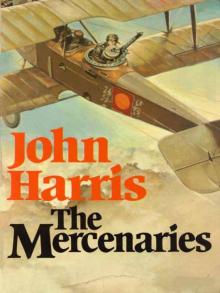 The Mercenaries
The Mercenaries Road To The Coast
Road To The Coast The Thirty Days War
The Thirty Days War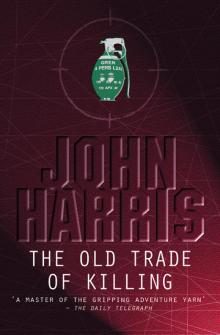 The Old Trade of Killing
The Old Trade of Killing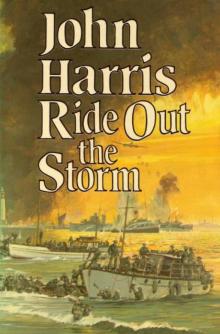 Ride Out The Storm
Ride Out The Storm Corporal Cotton's Little War
Corporal Cotton's Little War Fox from His Lair
Fox from His Lair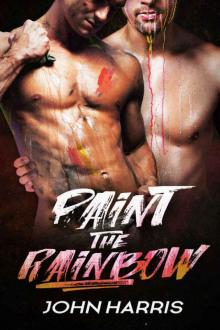 Paint The Rainbow
Paint The Rainbow Flawed Banner
Flawed Banner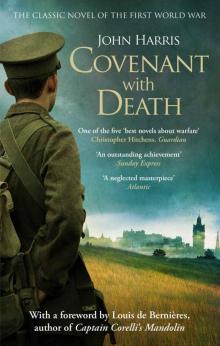 Covenant with Death
Covenant with Death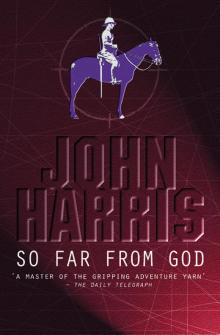 So Far From God
So Far From God The Sea Shall Not Have Them
The Sea Shall Not Have Them The Cross of Lazzaro
The Cross of Lazzaro Smiling Willie and the Tiger
Smiling Willie and the Tiger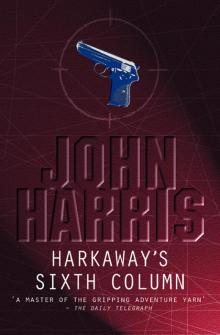 Harkaway's Sixth Column
Harkaway's Sixth Column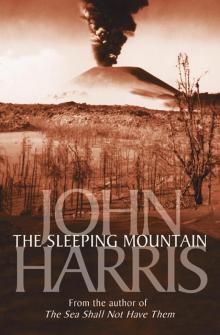 The Sleeping Mountain
The Sleeping Mountain The Claws of Mercy
The Claws of Mercy North Strike
North Strike Picture of Defeat
Picture of Defeat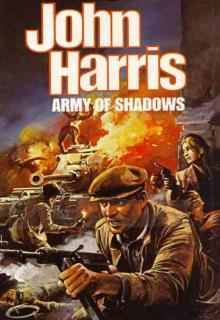 Army of Shadows
Army of Shadows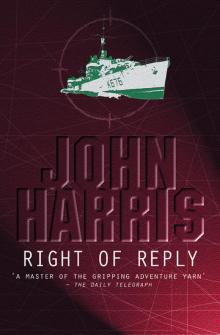 Right of Reply
Right of Reply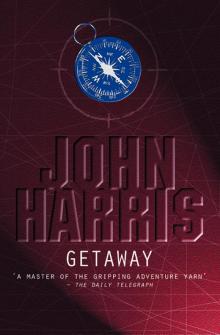 Getaway
Getaway The Lonely Voyage
The Lonely Voyage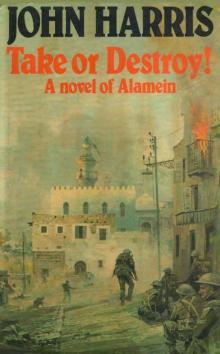 Take or Destroy!
Take or Destroy! The Backpacker
The Backpacker A Funny Place to Hold a War
A Funny Place to Hold a War Swordpoint (2011)
Swordpoint (2011) A Kind of Courage
A Kind of Courage